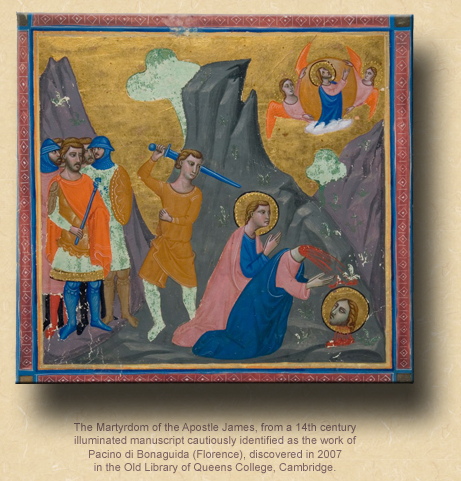Learning the Language of the Cross.
The Third Wednesday of Lent;* and, the Commemoration of King Saint Casimir.
Lessons from the feria, according to the ordinary form of the Roman Rite:
• Jeremiah 18: 18-20.
• Psalm 31: 5-6, 14-16.
• Matthew 20: 17-28.
The Third Wednesday of Lent; the Commemoration of Saint Casimir, Confessor; and, the Commemoration of Saint Lucius I, Pope & Martyr.
Lessons from the feria, according to the extraordinary form of the Roman Rite:
• Esther 13: 8-11, 15-17.
• Psalm 27: 9, 11.
• Psalm 102: 10.
• Matthew 20: 17-28.
The Third Wednesday of the Great Fast; and, the Feast of Our Venerable Father Gerasimus of the Jordan.
Lessons from the triodion, according to the typicon of the Byzantine-Ruthenian Rite:
[For the Presanctified:]**
• Genesis 7: 6-9.
• Proverbs 9: 12-18.
FatherVenditti.com
|
 9:45 AM 3/4/2015 — The lesson presented to us today in the Holy Gospel dovetails nicely with what was presented to us last Thursday, on which occasion I shared with you some thoughts on the most common type of prayer: the prayer of petition; and, I had suggested to you that you add an item to your daily examination of conscience during Lent: a little inventory of the ratio between what we ask of God and what we thank Him for. And I had left you with a quote from Saint John Vianney: “God has never denied, and never will deny, anything to those who ask for his graces in the right way” (Sermon on Prayer), with an emphasis on those last four words. 9:45 AM 3/4/2015 — The lesson presented to us today in the Holy Gospel dovetails nicely with what was presented to us last Thursday, on which occasion I shared with you some thoughts on the most common type of prayer: the prayer of petition; and, I had suggested to you that you add an item to your daily examination of conscience during Lent: a little inventory of the ratio between what we ask of God and what we thank Him for. And I had left you with a quote from Saint John Vianney: “God has never denied, and never will deny, anything to those who ask for his graces in the right way” (Sermon on Prayer), with an emphasis on those last four words.
Today's lesson gives us an opportunity to go a step further, but requires us to set aside the boilerplate reflection on this passage as a simple, devotional reminder of how we must be willing to drink from the cup of the Passion and suffer along with Christ. All of that is true, of course, but how many times can we repeat it?
When viewed within the context of our Lord's lesson on prayer begun last week, a new dimension has been added on how we are the pray: having learned that we must always pray with a sense of gratitude for what we've already received, now we learn that we must also pray with humility and abandonment; a much more difficult task to master, because it requires us to understand and speak the language of the Cross, and very few of us can. When Jesus asked James and John whether they could drink from the cup from which He must drink, they said they could, but I doubt they understood what He meant. Last Sunday, when these same two were privileged to witness the Transfiguration along with Peter, and our Blessed Lord warned them not to say anything to anyone until after He had risen from the dead, Saint Mark specifically told us that they didn't know what this meant (cf. Mark 9: 10).
The language of the Cross is not easy to understand; in fact, it's impossible to understand for someone just beginning the journey of the interior life, and whose prayer is still on the level of “God, give me this” or “God, rescue me from that.” When I first came here to the Shrine, I was questioned why I never use the already composed petitions from the “Pastoral Companion,” and I explained that I just don't like the idea of telling God what we want Him to do; and, I referenced a remark once made by then-Pope Benedict about how he had always thought that the petitions should be done according to a set formula which never varies, so that we aren't presuming to impose an agenda on God. And you may have noticed that sometimes I'll close the Bidding Prayers with an invocation asking God to grant our desires only if it is His will, begging from Him the Grace to accept His will in all things. One could legitimately presume that that's understood in every prayer, but I'm not sure that it is, especially when the petitions being read sometimes at Mass sound like they were composed by someone at the New York Times or in the Democratic National Committee.
During the season of Lent we hear a lot of confessions here at the Shrine, and one of the most common complaints a priest hears in confession is from souls who simply don't understand why bad things are happening to them. And, as a priest you want to help them understand, and you try, but you know that there's no more chance of them understanding what you tell them than if you explained it in Japanese. They simply don't understand the language of the Cross. No one whose relationship with God hasn't progressed beyond “God, give me this” or “God, give me that” could possibly understand. That's why, when the mother of James and John asked our Lord to grant them a place next to Him in the Kingdom to come, he said right away to them: “'You know not what you ask. Can you drink the chalice that I shall drink?' They say to him: 'We can'” (Matt. 20: 22 Douay-Rheims), but they have no idea what he's talking about. Drinking from a cup belonging to another was a common Middle Eastern expression of friendship and a willingness to share a common destiny; but, we already know, from what we learned last Sunday, that James and John couldn't yet grasp the whole concept of Jesus suffering and dying and rising from the dead; none of them could.
Now, it is a fact that just a few years after this, not long after our Lord's own death and resurrection, James would be beheaded on the orders of Herod Agrippa (cf. Acts 12: 2), but significant things had happened to him in the interval, principally his having experienced the events of Holy Week and Easter. And it wasn't just that he had suffered through them; he also had to internalize them, and embrace them, and make them his own so as to reproduce the sufferings of Christ in his own life, in complete abandonment to God's Holy Will. It isn't simply that he had suffered, but the fact that he suffered willingly for Christ that translated the language of the Cross for him. The same can be said of John's sufferings toward the end of his life.
In discussing this particular aspect of our Lord's lesson on prayer, St. Teresa of Jesus—Teresa of Avila—referenced this Gospel passage when she said, “His Majesty knows best what is suitable for us; it is not for us to advise Him what to give us, for He can rightly reply that we know not what we ask” (The Interior Castle, 2, 8); and, we won't know until we've not only suffered for Him, but have done so willingly, even joyfully.
That most eminent preacher and Father of the Church, Saint John Chrysostom, commenting on the Lord's reply to James and John, said,
The Lord knew that they could imitate His passion; but nonetheless, He asked them, so that for us too it is made clear that no one can reign with Christ who has not previously imitated His Passion. For highly-valued things are not obtained except at a high price (Homilies on Matthew, 25).
And when that is understood, then the language of the Cross, which previously was meaningless to us, now makes sense, and we can then say, along with Saint Paul,
Therefore I endure all things for the sake of the elect, that they also may obtain the salvation which is in Christ Jesus, with heavenly glory. A faithful saying: for if we be dead with him, we shall live also with him. If we suffer, we shall also reign with him (II Tim. 2: 10-12 Douay-Rheims).

* The Third Wednesday of Lent is what the Missal refers to as "Wednesday of the Second Week of Lent." Cf. the note regarding the designation of days during Lent, found here.
** Cf. the footnote in last Wednesday's post for an explanation of the Presanctfied Liturgy on the Wednesdays and Fridays of the Great Fast.
|

